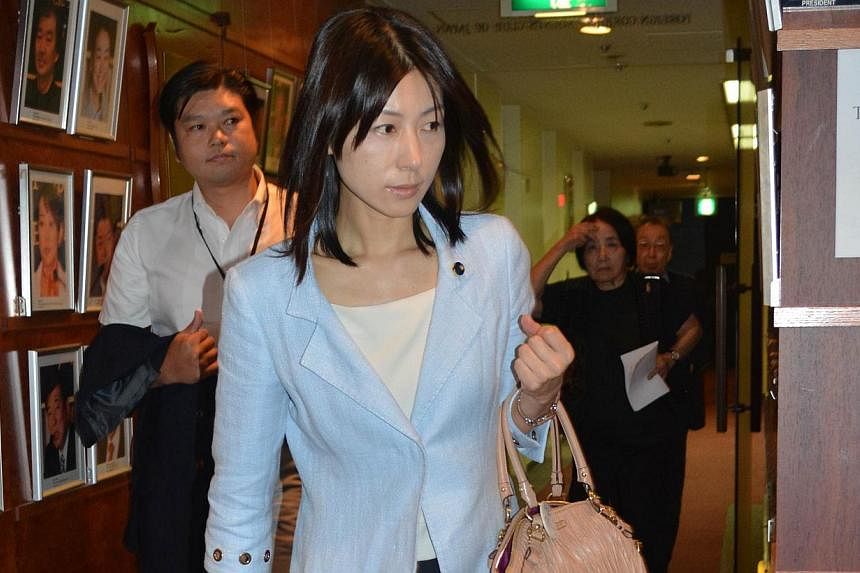It's hard to blame the world for thinking that the Japanese people are an ultra-polite lot.
Not only are they seemingly always bowing to each other, they are also known to be sticklers for decorum.
Japan's elected representatives address each other as "sensei", or teacher, so it was only natural to assume that they must be extra civil to each other, and especially to their female colleagues.
Or so we thought.
It wasn't until recently that the myth was shattered.
On June 18, rookie opposition politician Ayaka Shiomura, 35, stood up to make her maiden speech in the Tokyo Metropolitan Assembly.
Though nervous, she was nevertheless eager to call attention to the issue of Japanese women, their struggle with pregnancy and motherhood, and their need for more support services.
But her fellow assemblymen had other ideas.
When she asked the Tokyo government what it was doing to get women to have babies and to help young mothers ease back into the workforce, she was taunted by the assemblymen belonging to the ruling Liberal Democratic Party (LDP).
"Why don't you get married sooner?"
"Why don't you yourself have babies first?"
"You are unable to have babies?"
Ms Shiomura, who is from Your Party, braved through her 11-minute speech but broke down after returning to her seat.
Such heckling, as it turned out, is commonplace in nearly all of Japan's local assemblies. And in Japan's overwhelmingly male-dominated society, female politicians are viewed as easy targets.
Often, the jeering is not merely rude, but downright hurtful and discriminatory and, as in Ms Shiomura's case, clearly in the realm of sexual harassment.
There are worse examples.
In Abiko city outside Tokyo last year, assemblywoman Yuki Mizuno, 31, was stunned when a male colleague shouted loudly to her: "You are in a pantsuit today. Having your period?"
So it was no surprise that the Japanese media initially paid little attention to the Shiomura incident.
But after news of the sexist heckling made international headlines, sparking outrage, and with International Olympic Committee (IOC) officials due to arrive last Monday for talks on the 2020 Games that Tokyo is to host, the ruling party got a little worried. The IOC is known to be very sensitive to complaints of discrimination against host cities.
Worried that Japan's international image would be badly damaged, the LDP's Tokyo chapter finally trotted out assemblyman Akihiro Suzuki as the sole culprit - five days after the incident.
Just the day before, Mr Suzuki, 51, had repeatedly denied heckling Ms Shiomura. Still, the party scapegoat obligingly did an about-turn and admitted to having said - and only said - "Why don't you get married sooner?"
He denied he was out to question Ms Shiomura's integrity. He even pretended not to know she was single, which was highly unlikely since she was a minor celebrity on television before her election last year. Mr Suzuki also took part in the election and must have checked out all his rivals.
Just seconds after he apologised to Ms Shiomura in front of the cameras, Mr Suzuki was caught with a smirk on his face.
Seeing how Japan's male politicians are trampling all over their female counterparts, it is hard to take seriously Prime Minister Shinzo Abe's policy of elevating the position of Japanese women. In his much-touted growth strategy, he talks of having women occupy at least 30 per cent of executive positions throughout Japanese society.
That would entail stepping up assistance for childbirth and child-rearing so that women with young children can work more easily and, most importantly, eradicating prejudice against women in Japanese society.
"If these ideas and issues had been hammered into those politicians, such heckling would not have occurred in the Tokyo assembly," said the Mainichi Shimbun daily. "It just shows an unbelievable lack of understanding."
Eliminating jeering and teaching politicians how to behave may be almost impossible. Mr Abe once praised heckling as that which "makes for lively parliamentary debates". In fact, the Abe faction is notorious for having the rowdiest hecklers in the ruling party, if not in Parliament.
If Mr Suzuki thinks he was unjustly fingered, the LDP's Tokyo chapter itself is hardly repentant. It steadfastly refused to track down the rest of the LDP politicians who had joined in the heckling. Reports said some of the LDP politicians even wondered what the fuss was all about.
Associate Professor Tomomi Shibuya, an expert on gender issues at Tokyo Keizai University, criticised the LDP for sweeping the issue under the carpet. "Their attempt to close the subject cannot be forgiven," the Asahi Shimbun daily quoted her as saying.
In 2007, Japanese minister Hakuo Yanagisawa created an uproar when he described women as "baby-making machines" in a speech on the country's falling birth rate.
The Japanese, it seems, have not come very far since then.

